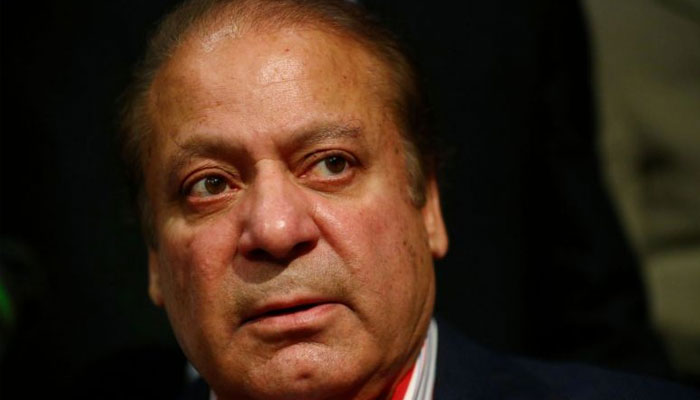Nawaz Sharif’s foreign travel for treatment: Return possible only when doctors certify ex-PM is fit to fly
ISLAMABAD: The Lahore High Court (LHC) order, allowing seriously ill deposed Prime Minister Nawaz Sharif to travel abroad for medical treatment, is time-bound but at the same time open-ended, in the sense of being subject to change in his foreign stay in view of his health condition.
Related: History and facts about air ambulances
“There is a clear room in the order, facilitating Nawaz Sharif to extend his foreign stay depending on his health condition,” prominent lawyer Kashif Malik told The News when contacted to explain the judicial decision of the two-member LHC bench.
He elaborated that although the former prime minister has been granted one-time permission to travel abroad as interim arrangement but the main plea in the petition filed by Pakistan Muslim League-Nawaz (PML-N) Shahbaz Sharif has been accepted.
More: ‘LHC conditions tougher than govt’s’
There is an unambiguous condition mentioned in the order for Nawaz Sharif to fly back home: he “will return when certified by doctors that he has regained his health and is fit to return back to Pakistan.”
Shahbaz Sharif’s undertaking deposited with the LHC contained similar words when it said: I undertake to ensure return of my brother Nawaz Sharif within four weeks or as and when certified by doctors that he has regained his health and is fit to fly back home.
Also, the LHC initially granted four weeks to the ex-prime minister to get treatment, the same period that was given to him by the government permission, attaching the condition of Rs7.5 billion indemnity bond, which was undone by the LHC.
Thus, Kashif Malik said, the order does and doesn’t specify the timeframe for the ex-premier’s return as his flying back will depend on his health condition in the wake of his treatment in Britain or the United States.
Since in one sense the LHC order is time-bound, it is difficult to predict or estimate by anybody how long doctors will take to certify that the former prime minister has “regained his health and is fit to return to Pakistan”.
It is not only known but was also established in the past that Nawaz Sharif will certainly not stay abroad this time as well even for a day when he will be given a go-ahead by the doctors to go back home. An apt example cited to the effect is his homecoming on July 13 last year, leaving his ailing wife in the hospital, a week after he was sentenced by an accountability court of Islamabad.
However, before the expiration of the first four weeks given by the LHC for treatment, the PML-N supremo will have to approach the court for extension of his foreign stay for the same purpose and will have to satisfy the LHC.
Simultaneously, Nawaz Sharif will be required to contact the Punjab government for extension of his eight-week release on bail by the Islamabad High Court (IHC), which ruled that he can approach the court of law for appropriate remedy in case of non-exercise of duty by the provincial administration or misuse of the discretion or its exercise in an arbitrary and whimsical manner in extending his release on health grounds.
The two undertakings signed by Shahbaz Sharif and Nawaz Sharif were made part of the judicial record. The document inked by the PML-N president undertakes two important steps of providing/sending the periodical medical report of the doctors duly notarised by the Pakistan embassy to the LHC registrar; and giving a right to an embassy representative to meet his physicians to verify or confirm about Nawaz Sharif’s health, if at any stage the federal government has credible information that he is living abroad despite his fitness to travel.
This means that medical reports would be submitted to the LHC if there was need for the ex-premier’s foreign stay beyond four weeks for his treatment.
The brief two-paragraph undertaking signed by Nawaz Sharif commits that he will return to Pakistan as per “my past record to face the process of law and justice within four weeks or as soon as I am declared healthy and fit to travel back to Pakistan by my doctors.” He also bound himself to the undertaking given to the LHC by Shahbaz Sharif.
The IHC order had said that in case Nawaz Sharif’s health does not improve and he needs further medical attention, the Punjab government may, on its own, decide the issue regarding suspension of the sentence. Even otherwise, he may approach the provincial government under Section 401(2) of Criminal Procedure Code (CrPC), it said.
It “noted with dismay” that despite its “observations” regarding different provisions of the CrPC and Pakistan Prisons Rules, the Kot Lakhpat Jail, Lahore, Superintendent, “never initiated or referred” the health matter for Nawaz Sharif’s release in spite of “his severe medical condition.”
The order also said that since the jail superintendent was under the Punjab government, the inspector general, prisons, could have made recommendations to it for the former prime minister’s release on account of indisposition, and the government, on its own, could have suspended the sentence if it was believed that the circumstances so warranted.
Meanwhile, the IHC will begin hearing on Nov 25 Nawaz Sharif's appeal against the accountability court verdict in the Al-Azizia reference and the National Accountability Bureau (NAB) plea against his acquittal in the Flagship case. Both these judgements were delivered by now suspended Judge Arshad Malik, who figured in the video scandal and is on that count facing the disciplinary proceedings by the LHC. Obviously, the hearings will be held in the former prime minister’s absence from Pakistan.
-
 King Hospitalized In Spain, Royal Family Confirms
King Hospitalized In Spain, Royal Family Confirms -
 Japan Launches AI Robot Monk To Offer Spiritual Guidance
Japan Launches AI Robot Monk To Offer Spiritual Guidance -
 Japan Plans Missile Deployment Near Taiwan By 2031 Amid Growing Regional Tensions
Japan Plans Missile Deployment Near Taiwan By 2031 Amid Growing Regional Tensions -
 Meghan Markle, Prince Harry Spark Reactions With Latest Announcement
Meghan Markle, Prince Harry Spark Reactions With Latest Announcement -
 Kate Hudson Reflects On Handling Award Season With No Expectations
Kate Hudson Reflects On Handling Award Season With No Expectations -
 6 Celebrities Who Have Been Vocal About Anxiety And 'panic Attacks'
6 Celebrities Who Have Been Vocal About Anxiety And 'panic Attacks' -
 Is This The Future Of Train Travel? Robot Dogs, Drones Are Redefining Public Transit Safety Through China’s New Metro Station Deployment
Is This The Future Of Train Travel? Robot Dogs, Drones Are Redefining Public Transit Safety Through China’s New Metro Station Deployment -
 Sarah Ferguson Seeks Hollywood Backing As Epstein Files Resurface
Sarah Ferguson Seeks Hollywood Backing As Epstein Files Resurface -
 China’s AI Milestone: ByteDance’s Doubao Chatbot Hits 100M Users During Lunar New Year
China’s AI Milestone: ByteDance’s Doubao Chatbot Hits 100M Users During Lunar New Year -
 Think You Know ChatGPT? Here Are 5 AI Levels You’ve Never Seen
Think You Know ChatGPT? Here Are 5 AI Levels You’ve Never Seen -
 Bitcoin Bounces From $62,000 As On-chain Metrics Signal Prolonged Weakness: Here Is Everything To Know
Bitcoin Bounces From $62,000 As On-chain Metrics Signal Prolonged Weakness: Here Is Everything To Know -
 Elon Musk Teases Official Grok CLI For Developers As AI Rivalry With Anthropic Heats Up
Elon Musk Teases Official Grok CLI For Developers As AI Rivalry With Anthropic Heats Up -
 Jennifer Aniston Ready To Walk Down The Aisle Again?
Jennifer Aniston Ready To Walk Down The Aisle Again? -
 Sarah Ferguson’s Plan Now That Andrew Is Thrown Into The Fire: ‘She’s Not Certain She’ll Come Out The Other Side’
Sarah Ferguson’s Plan Now That Andrew Is Thrown Into The Fire: ‘She’s Not Certain She’ll Come Out The Other Side’ -
 ‘The AI Doc’: What AI Leaders Told Daniel Roher Will Keep You Up At Night
‘The AI Doc’: What AI Leaders Told Daniel Roher Will Keep You Up At Night -
 Sarah Ferguson In Hiding As Arrest Fears Grow After Andrew Was Taken Into Custody
Sarah Ferguson In Hiding As Arrest Fears Grow After Andrew Was Taken Into Custody




